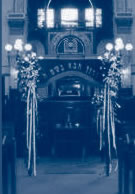|
SEDRA : Vayikra: Hertz Chumash p. 410 Leviticus
Ch.1
This week's Sedra is generously sponsored by Noel Levin OAM.
SYNOPSIS:
The book of Vayikra - Leviticus introduces the sacrificial
system to be performed in the now completed sanctuary.
The Hebrew word "KORBAN" (sacrifice) is based on
the word "KAROV" meaning "near". Thus
a Korban is a means of drawing near to G-d by supplicating
for Divine forgiveness or expressing appreciation for Divine
assistance.
The sacrificial system was confined to the Sanctuary and later
the Temple. Following the destruction of the Temples (586
BCE and 70 CE) sacrifices were suspended. Prayers now serve
some of the purposes originally covered by sacrifices.
The five principal Sacrifices which could be offered by an
individual were:
*OLAH - literally "that which ascends". This was
an offering completely consumed by fire on the Altar and expressed
the intention of the person to >ascend= and completely
devote their life to the service of G-d.
* MINCHA - gift offering, usually consisting of flour and
often brought by people of modest means. It was usually brought
in the afternoon, hence our afternoon services are called
"Mincha". The meal-offering expressed the idea of
consecrating one's work to the service of G-d.
* SHLAMIM - Based on the word "SHALOM"; a peace
offering which also relates to the Todah or thanks offering.
It is called a `peace offering' since it established a closer
relationship with one's Maker. Only a small portion was burned,
some portions were given to the Cohanim, and the rest was
eaten by the offerer, his family and friends in a state of
joy and gratitude.
* CHATAT - a Sin offering to atone for unintentional transgressions
either by individuals, the High Priest, King or the Sanhedrin
(High Court). The offering varied according to rank and means.
* KORBAN OLEH V'YORED - a sin offering the nature of which
varied according to the means of the individual.
* ASHAM - Guilt offering as part of the penitence required
for perpetrating certain improper acts. These included improperly
using or appropriating, property of the Sanctuary unintentionally
- ME'ILAH. Another form of the sacrifice related to `false
dealings' with one's fellow man especially in cases of breach
of trust.
THE HAPHTORAH HERTZ CHUMASH P. 424 Isaiah 43 - 21
The Prophet Isaiah deplores Israel's neglect of devotion
to G-d, worship in general and has moved away from the days
of the introduction of the Sacrifices - designed to draw Israel
closer to its Maker. Yet G-d will forgive and again redeem
them.
PURIM
Purim, observed on 14th Adar, commemorates the saving of
the Jewish communities living under Persian rule from Haman's
evil designs to exterminate them. It seems the events described
in the book of Esther, took place about 450 B.C.E. The name
Purim derives from the word pur - lottery, the method used
by Haman to select the date for a general massacre of the
Jews.
The sudden turn of events in the story of Purim which turned
the tables on the oppressor has provided a spark of hope and
encouragement to oppressed and victimised Jewish communities
throughout the centuries.
FOUR OBSERVANCES
* The most prominent observance of Purim is to listen to the
reading of the Scroll of Esther - the Megillah evening and
morning. Both men and women are required to listen to the
reading of the Megillah. Children should also be trained to
attend the Synagogue to fulfil this duty.
Purim observances are based on the following passages : "And
Mordechai wrote these things and sent letter to all the Jews
... to enjoin them that they should keep the fourteenth day
of the month of Adar as days of feasting and gladness, and
of sending portions one to another, and gifts to the poor.
And the Jews took upon themselves... and upon their descendants,
that they would keep these two days according to the writing
thereof and according to the appointed time, every year".
(Esther 9:20-23,27)
* A Festive family dinner Seudah should be held on Purim day
fulfilling the directive that these be days of feasting (y'mai
mishteh).
* Each person should "send portions" consisting
of at least two items of food that may be readily eaten to
several friends. This is called in Hebrew shalach manos or
mishloach manot.
* Each person should give gifts (charity) to at least two
poor people or worthy needy causes. Even a poor person who
is himself a recipient of charity must give to others. "A
person is required to drink on Purim until he does not know
the difference between `cursed be Haman' and `blessed be Mordechai'"
(Megillah 75). However one should not vulgarise his behaviour.
Although there is no prohibition of work on Purim one should
nonetheless abstain from one's regular job on Purim day (if
possible) and celebrate the holiday in the appropriate manner.
The custom to hold parades, carnival-type celebrations and
parties on Purim and the wearing of costumes and similar merrymaking,
especially by the children, is a particularly popular form
of Purim festivity.
BACK TO SHABBAT SHALOM
TABLE
|








